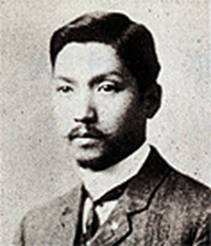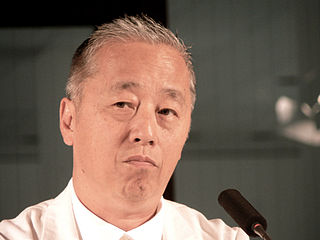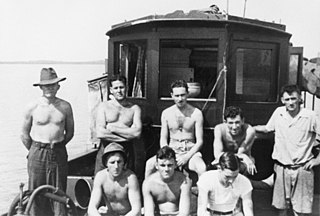Footnotes
- 1 2 Professor McCormack's ANU Profile. Archived 21 April 2013 at the Wayback Machine
- ↑ "Gavan McCormack's Kyunghyang Shinmun Column" (in Korean). Retrieved 11 September 2011.
Called "개번 매코맥 칼럼" in Korean
Gavan McCormack | |
|---|---|
| Awards | Fellow of the Australian Academy of the Humanities (1992) Ryukyu Shimpo Ikemiyagi Shui Prize (2008) |
| Academic background | |
| Alma mater | University of Melbourne (BA, LLB) University of London (MA, PhD) |
| Thesis | Chang Tso-lin, the Mukden Military Clique, and Japan, 1920–1928: The Development and interrelationships of Chinese warlordism and Japanese imperialism in northeast China (1974) |
| Academic work | |
| Institutions | Australian National University University of Adelaide La Trobe University University of Leeds |
| Main interests | Modern East Asian history,particularly Japan |
Gavan McCormack is a researcher specializing in East Asia who is Emeritus Professor and Visiting Fellow,Division of Pacific and Asian History of the Australian National University. He is also a coordinator of an award-winning open access journal The Asia-Pacific Journal:Japan Focus.
McCormack read Law and Arts at the University of Melbourne from 1955 to 1959,then spent the years 1960–1962 completing an MA in history. He spent the 1962–1963 academic year at Osaka University of Foreign Studies (OUFS),where he took a Diploma in Japanese Language and Culture. From 1963 to 1966 he studied Chinese at the School of Oriental and African Studies (SOAS) in London,taking a second-class degree. He then spent two years completing a second MA at SOAS in Area Studies (Far East). From 1969 to 1974 he worked on a PhD at SOAS. His thesis was Chang Tso-lin,the Mukden Military Clique,and Japan,1920–1928:The Development and interrelationships of Chinese warlordism and Japanese imperialism in northeast China. It was later published as a book.
McCromack's academic career took him to the University of Leeds in the United Kingdom,then to La Trobe University in Victoria,Australia,and eventually to the University of Adelaide in South Australia. In 1990 he was appointed Professor in Japanese at the Australian National University.
McCormack's main research interest is "modern Japanese (and East Asian) political,intellectual,and environmental history". [1] He has published widely in both academic and popular journals on the "liberation" struggles in South East Asia. In more recent times he has become more interested in environmental issues and in 1996 he published The Emptiness of Japanese Affluence,in which he attacked Japanese economic success as a mirage based on environmental exploitation that posed the single greatest threat to stability in the region. He has been a critic of the American government in general and has claimed that North Korea's efforts to obtain nuclear weapons are justified by American belligerence.
He has been a visiting professor at Kobe University,Kyoto University,Ritsumeikan University,Tsukuba University,International Christian University and Tokyo Institute of Technology. [1]
Gavan McCormack had contributed as a guest editorial staff of the South Korean newspaper,Kyunghyang Shinmun from December 2007 to December 2009. [2]
Called "개번 매코맥 칼럼" in Korean
The history of North Korea began with the end of World War II in 1945. The surrender of Japan led to the division of Korea at the 38th parallel, with the Soviet Union occupying the north, and the United States occupying the south. The Soviet Union and the United States failed to agree on a way to unify the country, and in 1948, they established two separate governments – the Soviet-aligned Democratic People's Republic of Korea and the American-aligned Republic of Korea – each claiming to be the legitimate government of all of Korea.

Wilfred Graham Burchett was an Australian journalist known for being the first western journalist to report from Hiroshima after the dropping of the atomic bomb, and for his reporting from "the other side" during the wars in Korea and Vietnam.

Ōsugi Sakae was a prominent Japanese anarchist who was jailed multiple times for his writings and activism. He was murdered alongside his partner, Itō Noe, in what became known as the Amakasu incident.

Michael Wilding is a British-born writer and academic who has spent most of his career at the University of Sydney in Sydney, Australia. He is known for his work as a novelist, literary scholar, critic, and editor. Since 2002 he has been Emeritus Professor in English and Australian Literature at the University of Sydney.

Sir Charles Gavan Duffy, KCMG, PC, was an Irish poet and journalist, Young Irelander and tenant-rights activist. After emigrating to Australia in 1856 he entered the politics of Victoria on a platform of land reform, and in 1871–1872 served as the colony's 8th Premier.

Hiroshi Sugimoto is a Japanese photographer and architect. He leads the Tokyo-based architectural firm New Material Research Laboratory.
Nihonjinron is a genre of historical and literary work that focuses on issues of Japanese national and cultural identity.

Ango Sakaguchi was a Japanese writer, who wrote short stories and novels and an essayist. His real name was Heigo Sakaguchi.

Jon Halliday is an Irish historian specialising in modern Asia. He was formerly a Senior Visiting Research Fellow at King's College London. He was educated at University of Oxford and has been married to Jung Chang since 1991. Halliday is the older brother of the late Irish International relations academic and writer Fred Halliday.

Z Special Unit was a joint Allied special forces unit formed during the Second World War to operate behind Japanese lines in South East Asia. Predominantly Australian, Z Special Unit was a specialist reconnaissance and sabotage unit that included British, Dutch, New Zealand, Timorese and Indonesian members, predominantly operating on Borneo and the islands of the former Dutch East Indies.

David Tacey is an Australian public intellectual, writer and interdisciplinary scholar. He is Emeritus Professor of Literature at La Trobe University in Melbourne and Research Professor at the Australian Centre for Christianity and Culture in Canberra.

The đàn tranh or đàn thập lục is a plucked zither of Vietnam, based on the Chinese guzheng, from which are also derived the Japanese koto, the Korean gayageum and ajaeng, the Mongolian yatga, the Sundanese kacapi and the Kazakh jetigen. It has a long soundbox with the steel strings, movable bridges and tuning pegs positioned on its top.
The Indonesia Open is the national open golf championship of Indonesia, and traditionally held in the capital, Jakarta.

James Phillip McAuley was an Australian academic, poet, journalist, literary critic and a prominent convert to Roman Catholicism. He was involved in the Ern Malley poetry hoax.
This is a timeline of Japanese history, comprising important legal, territorial and cultural changes and political events in Japan and its predecessor states. To read about the background to these events, see History of Japan.

Allegations that the United States military used biological weapons in the Korean War were raised by the governments of the People's Republic of China, the Soviet Union, and North Korea. The claims were first raised in 1951. The story was covered by the worldwide press and led to a highly publicized international investigation in 1952. Secretary of State Dean Acheson and other American and allied government officials denounced the allegations as a hoax. Subsequent scholars are split about the truth of the claims.
Robert Owen is an Australian artist and curator. He lives and works in Melbourne, Australia.
The Kuzuha International was a professional golf tournament in Japan between 1965 and 1990. It was played at the Kuzuha Public Golf Course in Kuzuha, Hirakata, Osaka. From 1978 to 1983, it was a Japan Golf Tour event.
Natalie King is an Australian curator and writer working in Melbourne, Australia. She specializes in Australian and international programs for contemporary art and visual culture. This includes exhibitions, publications, workshops, lectures and cultural partnerships across contemporary art and indigenous culture.
Yoshio Sugimoto is a sociologist based at La Trobe University, Melbourne, Australia, where he is currently Emeritus Professor.